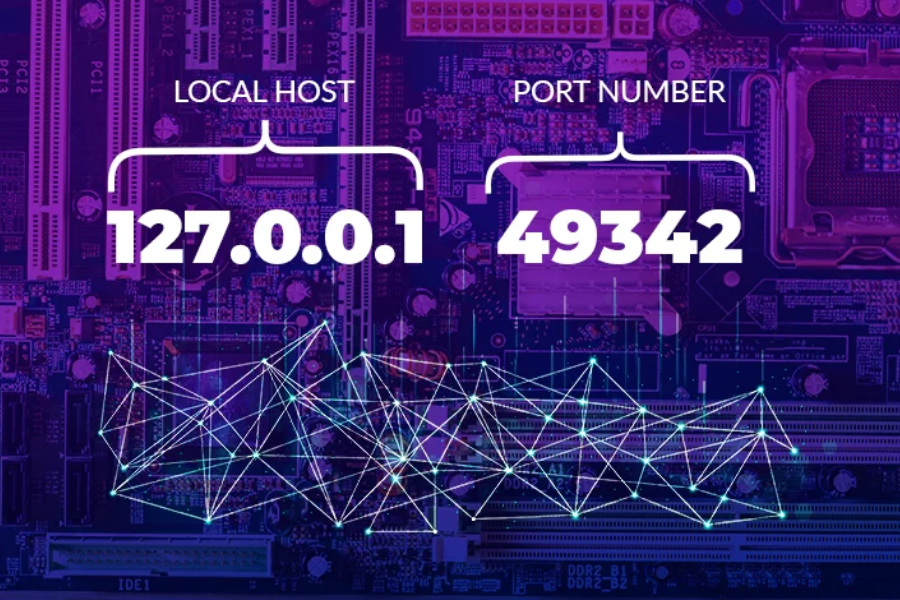What Is 127.0.0.1:49342 and Why It Is Important for Network Security
An Overview of IP Addresses and Their Significance for Network Security
In the expansive world of networking, IP addresses function as identifiers that help us navigate the web of interconnected devices and services. Among these addresses, one in particular—127.0.0.1:49342—holds a significant role in network security and system management. At first glance, this combination of numbers may appear random, but in reality, it serves a vital purpose.
This address is tied to the localhost, enabling internal communication between processes running on the same device. In network security, this mechanism is not only essential for testing and troubleshooting but also for securing internal operations from external threats. Understanding 127.0.0.1:49342 is key to ensuring a strong digital security posture, as this internal channel can be both a tool and a potential target.
Let’s delve into why this particular IP address and port number matter for network security, how they function, and the risks and benefits associated with their usage.
The Significance of 127.0.0.1:49342 in Network Security
127.0.0.1, also known as the localhost, is a crucial IP address used in computing for device self-communication. Essentially, it allows a machine to communicate with itself. When paired with a port number like 49342, this address becomes a communication channel for specific internal processes. This is particularly helpful in development environments for running tests or troubleshooting applications without exposing them to the wider internet.
However, the role of 127.0.0.1:49342 in network security extends beyond testing. It provides a controlled space for applications to interact, which can prevent security vulnerabilities from being inadvertently exposed. That said, if misconfigured, this internal pathway could potentially become an entry point for malicious activities. Therefore, proper management and security measures are essential when using 127.0.0.1:49342 to avoid exploitation.
Common Threats to Network Security and How to Mitigate Them
When discussing 127.0.0.1:49342 and its role in network security, it’s essential to be aware of the broader threats that any network may face:
- Malware: This includes viruses, ransomware, and trojans, which often infiltrate systems through deceptive downloads or malicious attachments. Once inside, they can hijack services running on local ports such as 49342.
- Phishing: This technique involves tricking users into revealing sensitive information by pretending to be a legitimate entity. Once inside the system, the attacker could potentially manipulate internal ports.
- Unsecured Networks: Public Wi-Fi and open networks are a breeding ground for cyberattacks. Hackers could intercept communications or exploit weak points, including those involving localhost addresses.
Mitigation strategies include:
- Implementing robust firewalls and antivirus solutions: These can help monitor traffic and prevent unauthorized access to your system, including activity on internal addresses like 127.0.0.1:49342.
- Regular system updates: Keeping software up to date ensures that known vulnerabilities are patched, reducing the risk of exploits.
- Strong password policies: Combining strong passwords with multi-factor authentication (MFA) adds an extra layer of security, making unauthorized access much more difficult.
- Employee training: Educating users to recognize suspicious activity can help mitigate phishing attempts and other social engineering attacks.
For secure remote access and troubleshooting, use 127.0.0.1:49342.
The 127.0.0.1:49342 address isn’t just limited to local application testing; it can also be used for secure remote access. In scenarios where remote troubleshooting or system management is required, IT professionals can utilize this localhost configuration to securely exchange data between applications without exposing sensitive information externally.
For developers, this IP address is invaluable for setting up a controlled environment to resolve software issues or conduct performance assessments. Since all interactions remain internal, it significantly reduces the risk of external breaches. Moreover, using 127.0.0.1:49342 ensures that traffic is contained within the local machine, making it easier to identify and address any anomalies.
The Best Ways to Use 127.0.0.1:49342 to Strengthen Your Network Security
To maximize the security of 127.0.0.1:49342, it is important to follow these best practices:
- Limit access: Only trusted internal applications or users should have access to this IP address. Ensure that unnecessary services are not listening on 49342.
- Implement strict firewall rules: Configuring firewalls to monitor traffic directed at 127.0.0.1:49342 is crucial. Any unexpected or unauthorized traffic should trigger alerts.
- Utilize secure protocols: For enhanced security, use encrypted protocols like SSH (Secure Shell) when transmitting data through 127.0.0.1:49342. This helps to protect data from interception.
- Regular updates: Frequently updating software ensures that any vulnerabilities related to 127.0.0.1:49342 are patched.
- Conduct audits: Periodically audit services and applications running on 49342 to check for potential weaknesses or misconfigurations.
By adopting these practices, organizations can reduce the risk of internal communication channels being exploited.
Real-World Applications of 127.0.0.1:49342
In real-world scenarios, 127.0.0.1:49342 is frequently used by:
- Software Developers: Developers rely on this address to run tests and develop software in a safe environment without exposing the application to the public internet.
- Network Administrators: They use 127.0.0.1:49342 for monitoring and troubleshooting network traffic within the system. This allows them to assess the performance and security of internal communications without risking exposure to external threats.
- Cybersecurity Analysts: They analyze traffic directed at 127.0.0.1:49342 to detect anomalies or signs of malicious activity. This helps in identifying potential internal threats before they escalate.
- Ethical Hackers: In penetration testing, ethical hackers may exploit this address to uncover weaknesses in applications running on local servers. Their findings are crucial in bolstering system defenses.
Understanding the Meaning of 127.0.0.1:49342
To fully understand the function of 127.0.0.1:49342, it’s essential to break down its components:
- 127.0.0.1: Known as the loopback IP address, it allows a device to communicate with itself. This internal communication is necessary for many testing and network operations.
- Port 49342: The port number refers to a specific service or application running on the device. Each port serves a unique function, and port 49342 is often used by developers for local testing or communication between internal processes.
Though this combination seems benign, it’s important to understand the security implications. A poorly secured or misconfigured service running on 49342 could be exploited by malicious actors if proper safeguards are not in place.
The Role of Ports in Network Security
Ports like 49342 are the gateways through which data enters and exits your system. They play a critical role in network security, as each port corresponds to a specific service or application. For instance, port 443 is used for HTTPS traffic and port 80 is usually used for HTTP traffic.
Open ports can be a vulnerability if left unsecured. Attackers often scan for open ports to find weak points in a network. By monitoring which ports are active and ensuring that only necessary ones are open, organizations can reduce their exposure to attacks.
Firewalls are commonly used to regulate port activity, acting as the first line of defense against unauthorized access. Properly configured firewall rules are crucial for securing ports like 49342.
How 127.0.0.1:49342 Can Be Used for Malicious Purposes
While 127.0.0.1 is generally considered safe, it can be exploited for malicious purposes when paired with ports like 49342. Here’s how:
- Unauthorized access: If an application running on port 49342 is misconfigured, it could be accessed by other programs or users on the same machine. This could lead to data theft or manipulation.
- Malware: Malware may use 127.0.0.1 to execute commands on the host machine. This allows attackers to interact with local resources without alerting external defenses.
- Ransomware: In some attacks, ransomware has been known to use localhost ports to establish command-and-control operations, bypassing traditional firewalls.
Steps to Protect Against Potential Threats from 127.0.0.1:49342
To mitigate threats involving 127.0.0.1:49342, consider the following steps:
- Secure firewall settings: Ensure that your firewall is properly configured to block unauthorized traffic while allowing legitimate data flow through 49342.
- Regularly update software: Keeping software updated ensures vulnerabilities are patched, reducing the risk of exploitation.
- Implement MFA: Multi-factor authentication adds an extra layer of security, making it harder for attackers to gain access, even if credentials are compromised.
- Monitor network activity: Continuously monitor traffic to detect unusual behavior involving 127.0.0.1:49342 or any other internal ports.
- Educate users: Informing your team about the risks of misconfigured local ports and suspicious online activity can help prevent attacks.
By taking these precautions, you can reduce the risk of threats involving 127.0.0.1:49342 and strengthen your overall network security.
Conclusion
The 127.0.0.1:49342 address is a vital tool for internal communication and system management, particularly in development and testing environments. However, like any tool, it must be used responsibly and secured properly to prevent it from becoming a liability. Understanding the purpose and potential risks of this localhost configuration is essential for maintaining a robust security posture in today’s digital landscape.
127.0.0.1:49342 plays a significant role in both everyday network functions and in safeguarding internal processes from external threats, making it a critical component of network security.






